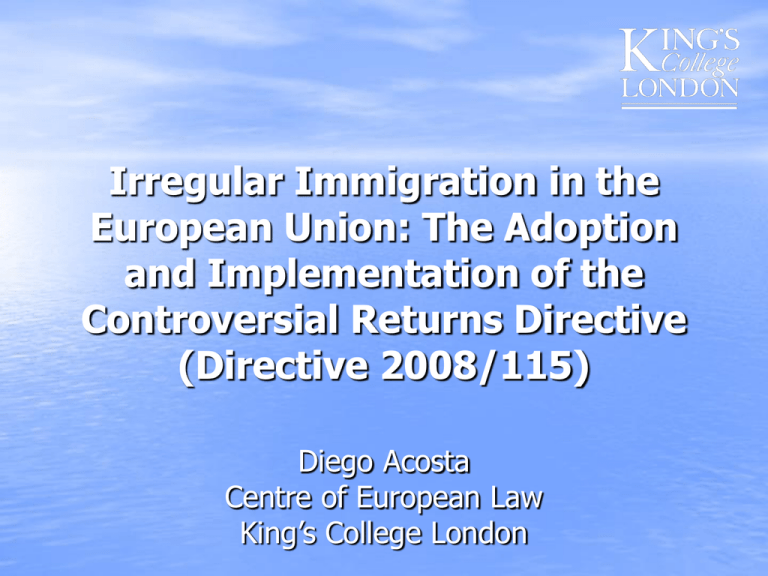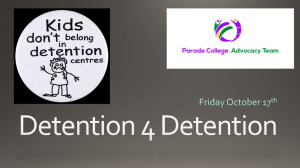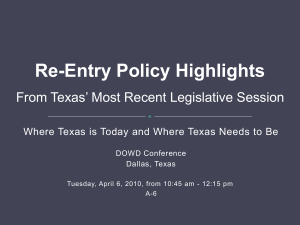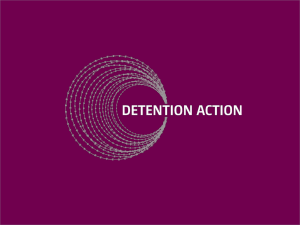Is the European Parliament Becoming Bad and Ugly? The Returns
advertisement

Irregular Immigration in the European Union: The Adoption and Implementation of the Controversial Returns Directive (Directive 2008/115) Diego Acosta Centre of European Law King’s College London 3 actors in the EU • Good: Parliament. No legal power, open stance towards migration. • Bad: Council. Restrictive view, consider migration as part of their sovereignty. • Ugly: Commission. Open view, but not “sexy enough” from the point of view of the Council. Commission Proposal European Parliament Council. Opinion Common position “Trialogues” • Trialogues: secret meetings between the Council (the Presidency) and the EP (the rapporteur) to arrive to first reading compromises. • Negotiations informal and opaque. Hence, they enhance efficiency at the expense of accountability. • Contrary to the principle of openness and visibility of proceedings of the EP. The Returns Directive • Directive on common standards and procedures in Member States for returning illegally staying third-country nationals. • Criticisms: – Detention up to 18 months. – Re-entry ban up to 5 years. Both linked to: – Voluntary departure only between 7 and 30 days. Two questions • Did the involvement of the European Parliament produce a more open migration policy with this Directive? • Is the European Parliament changing its rationale towards immigration? Is it becoming “bad” and “ugly”? Issues • Scope • Period of voluntary departure • Re-entry ban • Remedies • Detention • Unaccompanied minors Re-entry ban. • For a period not longer than 5 years. • Some cases in which the re-entry ban may be withdrawn. • When should the re-entry ban be imposed? • What were the cases in which a re-entry ban should not be imposed or withdrawn? Re-entry ban. • Optional. • Compulsory. • More cases in which it • Discretion from the might be withdrawn. MS not to impose or withdrawn the reentry ban. Re-entry ban. • Compulsory in two cases: – No period for voluntary departure granted. – Obligation to return has not been complied with. • MS have to consider withdrawing or suspending the ban when the – TCN has complied with the return decision. – Victims of trafficking in human beings can not be imposed a re-entry ban. Detention. • 6 months maximum limit. • Custody orders controlled by judicial authorities within 72 hours. • What was the maximum period of time that a TCN could be deprived of his/her freedom? • What controls should MS put in place in case of detention ordered by an administrative authority? Detention • 3 months maximum • except in some specific cases where it could be extended to 18 months. 48 hours. • 6 months to • indefinite. Speedy judicial review in accordance with national law. Detention. • 6 to 18 months. • Provide for judicial review to be decided expeditiously from the beginning of the detention. Voting in the Parliament • Pragmatism • Fear of the following French Presidency • Pressure from the respective national governments • Procedural constraints Content of the Returns Directive • Period for voluntary departure: 7-30 days. • Re-entry ban: up to 5 years. • Possibility of detention: up to 18 months. Implementation: Spain & Italy • Largest number of migrants received since 2000. • Large number of undocumented migrants. • Different regularization processes. Implementation: Spain • Voluntary departure: Now 7 to 30 days. • Re-entry ban: Now up to 5 years. • Detention: From 40 days before to 60 now. Implementation: Italy • Entering or staying in Italy is a crime punishable by a fine of 5 to 10 thousand Euros. • Detention from two to six months. Conclusions • EP did not do enough although it improved the Directive. • Dangerous signal for the future of codecision process in this area. • Questions involving the democratic process in the EU. • ECJ role important in the future. Case Kadzoev C-357/09. Conclusions • Hence, Parliament still good but certainly becoming worse and uglier. • Implementation brings positive and negative news from the point of view of migrant’s rights. • EU should think about the message it sends to special partners (LAC). • EU LAC meeting 18 May. Thank you very much! Comments, critiques: Diego.acosta@kcl.ac.uk








